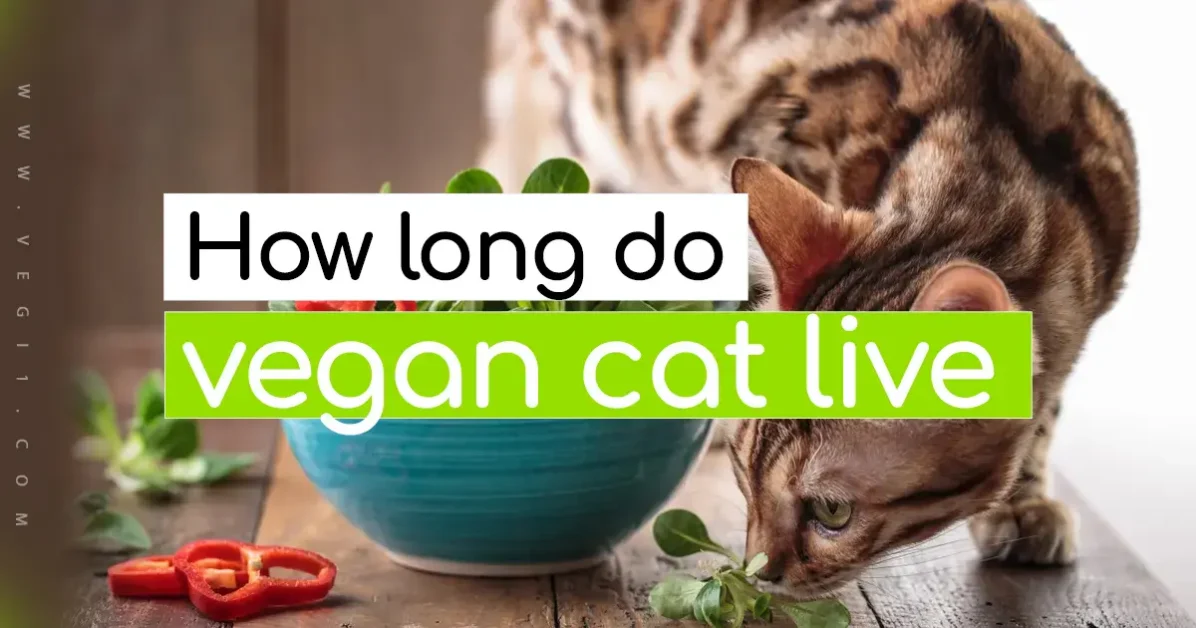How long do vegan cats live

I had been following a vegan diet for three years and experiencing a great sense of health and vitality. Two years had passed since my cat, who had been with me.
I named him “Mozi.” I had taken responsibility for him, and he had become a member of our family. I saw him as my own child. Proper nutrition for my cat, Mozi, was a significant duty that fell on me. I had truly grown accustomed to Mozi and wanted him to have a healthier and longer life.
Typically, pedigree cats live to be around 12-16 years old, but given the importance I placed on his health, according to his veterinarian, he could possibly live up to 18 years.
Over time, I came across some new information about plant-based diets for cats. The information was interesting but seemed unbelievable to me! One day, a friend shared a picture with me from one of the blogs. It was a picture of a dog, and its owner had written on the image: “Tonight’s dinner for Maggie includes sweet potato, brown rice puree, chia seeds, and…”. Hearing different opinions about plant-based diets for cats, combined with this image, left me puzzled, and I decided to embark on serious research on this topic.
Honestly, it was difficult for me to buy meat, chicken and fish
I couldn’t put animal carcasses on my plate, I didn’t want other animals to get hurt because of my food, so how could I put it on my cat’s plate?
My excitement for this research and study was so great that it kept me awake at night. My thoughts about my cat’s nutrition led me into the familiar world of my own vegan diet. Oh, how wonderful it would be if my cat could join me in a vegan lifestyle! A domestic vegan cat with a lifespan of over 18 years! Perhaps I could decide to feed my cat with vegetables, mashed sprouts, and such things from now on!
Now it’s the year 2024. Seven years have passed since my research began, and it continues to this day. Here, I share with you my seven years experiences of studies on vegan cats so that if you, like me, have concerns about the health and lifespan of your cat, you can make an informed decision.
The main question that was always on my mind and drove me to start this research was: How long do vegan cats live? I needed to answer this main question in order to feel confident about changing my beloved cat’s diet. This research felt risky to me; a slight mistake in this matter could have had a negative impact on my cat’s well-being.
There were conflicting opinions about vegan diets for cats, and I needed to come to a proper conclusion. As I delved deeper into my research and studies, it seemed like every website and social media platform was filled with the information I needed.
The lifespan of cats on a plant-based diet was a highly important and debated topic.
Many factors always influence the lifespan of a cat. Breed, genetics, age, healthcare, living environment, physical activity, social companionship, relaxation, security, amount of rest, environmental factors like weather, and, alongside all of these, appropriate nutrition all play a role in the lifespan of a cat.
My cat, Mozi, was a good cat in terms of breed and genetics. The other factors depended on me and my attention. I had to invest in those factors to ensure that my beautiful cat would stay with me for a longer time. Among these factors, nutrition was the most important thing that concerned me, and opting for a vegan diet for Mozi had become a more serious topic for me than before.
Continuing my research led me to some new and interesting findings.
It was estimated that the carbon emissions produced by animal meat consumption amounted to around 64 million tons of carbon dioxide per year, equivalent to the emissions generated by 13 million cars in a year.
Supporters of companion animals and environmental enthusiasts were thinking about healthier nutrition for pets, and perhaps this was one of the significant and controversial reasons for veganizing companion animals. However, there were still many challenges to overcome.
My studies and research continued, and although I was a vegan, I hadn’t fully transitioned Mozi, to a vegan diet yet.
Occasionally, I fed him with vegan meals. I believe that animals, like humans, don’t respond well to sudden changes, both physically and mentally. I was afraid that if I suddenly changed his diet to vegan, he might develop health problems.
So, I calmly continued. With just a small change in diet, I noticed that my cat had become more vibrant and energetic than before. It really amazed me, but I didn’t rush. I gradually increased their plant-based meals.
However, in 2020, the British Veterinary Association declared that cats are obligatory carnivores and should not be fed a vegetarian diet. And they were right! I shouldn’t forget that cats are carnivorous and they require significant amounts of animal proteins, fats, carbohydrates, fiber, vitamins, minerals, and amino acids for their growth and survival.
But could there be another way to provide the nutritional resources found in meat, such as proteins and fats, to a cat?
In pursuit of this question, I came across some nutritional experiments.
The nutritional experiments conducted by Dr. Sarah Dad were published in 2021. Dr. Sarah Dad, a practicing veterinarian and PhD student in plant-based nutrition for companion animals, conducted a study on the health of domestic cats and dogs with a meat-based (MB) and plant-based (PB) diet at the University of Guelph in Canada.
A total of 1325 cat and dog owners participated in Canada and the United States.
The results of these experiments seemed very promising for people like me who were considering inviting their cats to a plant-based diet.

82% of cat owners on a plant-based diet reported that their cats were in very good overall condition, compared to 65% on a meat-based diet.
68% on a plant-based diet had a very good physical condition compared to 54% on a meat-based diet.
This new study somewhat answered the question of whether cats can follow a vegan diet and challenged the long-standing assumption that cats are carnivorous and cannot thrive on a meatless diet. In terms of lifespan, vegan and carnivorous cats were similar.
I knew that a cat could be perfectly compatible with a plant-based diet and still remain healthy and alive. As a result of this research, it became clear that there was no difference in lifespan between cats on a plant-based diet and those on a meat-based diet.
But I wanted to find a more accurate answer to my main question:
- How long can a cat live without meat?
The lifespan of my beloved cat, Mozi, was crucial.
I carefully studied Dr. Sarah Dad’s experiments and surveys. One result stood out to me.

Diseases and health conditions were also reported by cat owners in this study. Most diseases occurred less frequently in cats on a plant-based diet compared to carnivorous cats. Cats on a vegan diet had a lower prevalence of digestive diseases, kidney diseases, and diabetes.
Continuing with this research, when I discovered that my cat could have better physical health with a vegan diet, it caught my attention. This result, along with my own experience, was very important to me. I had experienced that Mozi, my playful cat, had more vitality and energy with the consumption of some plant-based foods.
Hopefully, I consulted with a specialist in plant-based diets for animals. With the guidance of a good expert, I gained more detailed information. This plant-based specialist mentioned a few points about domestic animals and veganism:
- Most of the food for carnivorous cats contains corn and other plants. So, the notion that it is unnatural to feed your cat a plant-based diet is like saying it is unnatural to feed your cat at all! The cat’s diet should be enriched with taurine and arachidonic acid. If you only fed your cat fish, it wouldn’t be healthy.
- According to Daniella Dos Santos, the President of the British Veterinary Association (BVA) regarding plant-based diets for pets: “In theory, feeding dogs a plant-based diet is possible, but getting it wrong is much easier than getting it right.”
It’s true that Dos Santos was talking about dogs, but this dear specialist wanted to emphasize the importance of the matter and stressed that if I wanted to fully transition my cat to a vegan diet, I should be very careful to ensure that my cat receives all the necessary nutrients because otherwise, the outcome could be the opposite.
- Dr. Sara Dad’s published nutritional experiment in 2021 showed that not only can cats thrive on a plant-based diet, but they can also have a healthier and longer life.
However, this extended lifespan is only possible when Mozi consumes a completely plant-based diet and is fortified with taurine, arachidonic acid, vitamins A, D3, and other necessary nutrients.
- Another study conducted in 2022 by scientist Dr. Andrew Knight and his colleagues collected survey responses from 1,369 cat owners. These individuals were asked to report on a cat in their home that had been on a plant-based or meat-based diet for at least one year. In the survey, participants were asked several questions about their cat’s health and its dietary regimen. The results of this study demonstrated that animals consuming plant-based protein-based diets are healthier, have fewer diseases, and require less veterinary care compared to animals consuming fresh meat.
- 59 cats were examined in Germany, Switzerland, and Austria. According to their owners’ reports, these cats had been on a plant-based diet for 5-6 years. They discovered that 38 out of the 59 cats had better skin after switching to a plant-based diet, and some even resolved skin issues.
In summary, these findings highlight the potential benefits of a plant-based diet for cats, including improved health and overall well-being.
- Dr. Eric Weisman’s Method: Dr. Eric Weisman, an international scientist, and veterinarian specializing in plant-based nutrition for pets, has introduced a method that includes several practices to improve the health and prolong the lives of dogs, cats, and ferrets by over 35%:
- Using distilled water as drinking water.
- Cooking food with gentle heat.
- Keeping pets away from GMO grass that contains pesticides.
- Including flaxseed in the pet’s diet (to prevent inflammatory diseases of the skin, heart, brain, pancreas, arteries, and other internal organs, add 1/4 teaspoon of ground flaxseed per 10 pounds of body weight).
Using plant-based canned foods that meet the following criteria:
- Free of toxic chemical preservatives and using non-toxic vitamin-based preservatives.
- Processed without using uranium irradiation to eliminate harmful bacteria and viruses, only using gentle cooking methods.
- Packaged in non-BPA packaging.
- Meeting the guidelines of the U.S. Food and Drug Administration (FDA), the National Research Council (NRC), and the Association of American Feed Control Officials (AAFCO) to provide 100% plant-based protein and complete nutrients for all life stages of cats and dogs.
- Home Health Testing (gradual transition to plant-based foods and monitoring the cat’s physical conditions and progress towards becoming vegan). A check-up kit for cats can identify the most common issues among pets, including high glucose levels, kidney failure, urinary tract infections (UTIs), and blood in the urine.
- Using necessary nutritional supplements.
Conclusion
So I did some research on the question “Are vegan cats healthier?” and I concluded:
It seems like cats can actually thrive and be healthier without eating meat, as long as their vegan diet is nutritionally complete and balanced. Some people worry that a plant-based diet might cause nutritional deficiencies and shorten a cat’s lifespan, but that’s not necessarily true. Just like humans, cats need to get the right nutrients to stay healthy, and any diet should be well-balanced to avoid any health issues. Studies have shown that cats on vegan diets are often healthier than those on meat-based diets.
I’ve been feeding my cat a vegan diet for about a year now, and she’s doing great! We both enjoy the awesome vegan food. My cat, Mozi, is 9 years old and thriving on her plant-based diet, with the help of proper supplements.
So, you can definitely consider a vegan diet for your cat or maybe a combination of carnivorous and herbivorous if you do some thorough research and make an informed decision!
Further Reading and References:
- https://www.tumblr.com
- https://happypet.pet/vegetarian-cat
- https://vecado.ca/blogs/vegan-pet-food/how-long-do-vegan-cats-live
- https://vecado.ca/pages/cats101
- https://petfoodshop.com/blogs/news/how-long-do-vegan-cats-live
- https://bmcvetres.biomedcentral.com
- https://vecado.ca/blogs/
- https://theconversation.com
- https://www.news-medical.net
- https://journals.plos.org/
- https://www.jpost.com/science/article-759507
- https://www.trustedhousesitters.com
- https://www.amipetfood.com/










